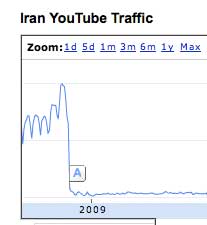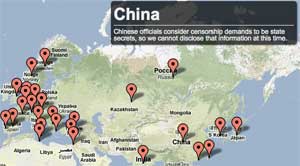 Looking back at some of the talk in the halls of the US Congress for about the last year, particularly about clarifying (or solidifying) Executive branch (they’re saying the President) authority to shut down some Internet capabilities in the case of an emergency[1. a) limiting access in time of {cyber} war, b) former CIA Director Michael Hayden in LA Times, c) President Bill Clinton’s plan, d) the flap over a possible (but not really proposed) Internet Kill Switch], such as a cyber-attack, makes me think that humans are fond of just shutting their eyes when faced with danger. [Read more…]
Looking back at some of the talk in the halls of the US Congress for about the last year, particularly about clarifying (or solidifying) Executive branch (they’re saying the President) authority to shut down some Internet capabilities in the case of an emergency[1. a) limiting access in time of {cyber} war, b) former CIA Director Michael Hayden in LA Times, c) President Bill Clinton’s plan, d) the flap over a possible (but not really proposed) Internet Kill Switch], such as a cyber-attack, makes me think that humans are fond of just shutting their eyes when faced with danger. [Read more…]
“Eyeballs-on-site” yielding to “eyeballs-on-content”
 When the web was new, the goal was to get as many “eyeballs” as possible looking at your site content—to aggregate readership with your site being the aggregation point. This pretty much followed the old rules of advertising and promotion—you needed people to see your advertising in order to succeed financially[1. Oh, wait, what do I mean “old rules” here? It’s still true, and that’s why the rest of this article is germane.]. The phrases “visit us often” or “bookmark this site” or “come back frequently” were the conventional wisdom, and web surfers used bookmarks to remember what sites they wanted to go back to and read later. But they mostly never did except for the big news or entertainment portals.
When the web was new, the goal was to get as many “eyeballs” as possible looking at your site content—to aggregate readership with your site being the aggregation point. This pretty much followed the old rules of advertising and promotion—you needed people to see your advertising in order to succeed financially[1. Oh, wait, what do I mean “old rules” here? It’s still true, and that’s why the rest of this article is germane.]. The phrases “visit us often” or “bookmark this site” or “come back frequently” were the conventional wisdom, and web surfers used bookmarks to remember what sites they wanted to go back to and read later. But they mostly never did except for the big news or entertainment portals.
RSS feeds and news readers began to change that. (Thanks Dave[2. Dave Winer].) I use NetNewsWire’s standalone software on my Mac, and online services like Google Reader let you integrate feeds into your iGoogle home page. You can also sync your Google Reader settings across multiple programs and devices. But in the last couple of months, the scene is greatly changing is subtle ways I think people haven’t spotted yet… [Read more…]
Are hungry searchbots eating your small web site alive?
 I work with a dozen or so clients at any given time, and in the last three (or thereabouts) weeks I’ve noticed that some sites on small servers with limited capacity are being “eaten alive” by spidery searchbots. And not just the usual suspects—Google, Yahoo, MSN—but by specialized searchbots that exhibit a kind of behavior I haven’t seen very much before. It used to be that web site owners prayed for the searchbots to come by, and searchbots by and large were sparing in their examination of pages, not hitting a site very hard at all, but building an overall image of the pages on the site over a long time. [1. Illustration: “Spider & Crossbones” pirate flag]
I work with a dozen or so clients at any given time, and in the last three (or thereabouts) weeks I’ve noticed that some sites on small servers with limited capacity are being “eaten alive” by spidery searchbots. And not just the usual suspects—Google, Yahoo, MSN—but by specialized searchbots that exhibit a kind of behavior I haven’t seen very much before. It used to be that web site owners prayed for the searchbots to come by, and searchbots by and large were sparing in their examination of pages, not hitting a site very hard at all, but building an overall image of the pages on the site over a long time. [1. Illustration: “Spider & Crossbones” pirate flag]
But times are changing rapidly! Even a site with very little human traffic may be suddenly and catastrophically overwhelmed by searchbot traffic. [Read more…]
Google and YouTube censorship
 As a part of their effort to provide greater transparency about the use and blocking of their services, Google provides some interesting information which is available in “real time” online. Their Transparency Report: Traffic shows the relative traffic to their various services by country.
As a part of their effort to provide greater transparency about the use and blocking of their services, Google provides some interesting information which is available in “real time” online. Their Transparency Report: Traffic shows the relative traffic to their various services by country.
Just for example, if you look at traffic to YouTube from Iran, you’ll see this chart… showing high traffic until June, 2009, when YouTube was blocked in Iran. The scale runs from 0 to 100 and is “normalized” rather than showing absolute bandwidth that’s being used in each country. So it quite nicely illustrates various cases of heavy-handed content blocking.
To see how censorship effectively blocks YouTube in other countries, try looking at Bangladesh, China, Libya, and maybe some others you can discover in the data.
Google and government requests for data or removal
 Google receives requests, including court orders, from many countries, for data or for removal of information on the various services it provides (search, YouTube, etc.).
Google receives requests, including court orders, from many countries, for data or for removal of information on the various services it provides (search, YouTube, etc.).
They’re experimenting with putting up a page that shows the number of requests they’ve received, and (partially) the action they took, for the most recent six months.
You can view their map and click the pushpins to see country-specific data. For China, it says
Chinese officials consider censorship demands to be state secrets, so we cannot disclose that information at this time.
Isn’t it interesting that rather than saying “removal requests” Google used the word “censorship” in this case?
To read more about legitimate (legal) requests and requests that do not have the force of law behind them and may simply be trying to intimidate a web site owner, visit the Chilling Effects Clearinghouse.
The Open Net Initiative seeks to identify and document Internet filtering and surveillance.
- « Previous Page
- 1
- …
- 22
- 23
- 24
- 25
- 26
- …
- 90
- Next Page »